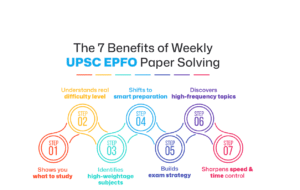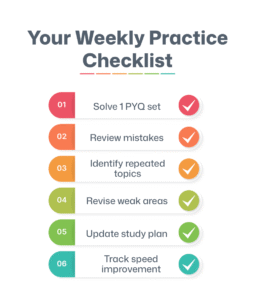Why Should You Solve UPSC EPFO Papers Weekly?
Why Should You Solve UPSC EPFO Papers Weekly?
We all know that the UPSC EPFO exam has been highly irregular, and because of this, many of you, when you start preparing for the exam, forget the most vital component for its preparation, the UPSC EPFO previous year paper. I have met many aspirants like you who think that solving past year papers of UPSC EPFO is unnecessary. But the truth is, solving the UPSC EPFO previous year paper is the smartest move you can make.
Since the UPSC EPFO exam has been so unpredictable, I can understand that gathering the UPSC EPFO previous year papers might make you feel confused. However, you need to remind yourself that it does not matter how old the PYQs are; you need to solve them consistently.
The solving and practicing of the UPSC EPFO previous year papers are also important because the UPSC EPFO syllabus is vast and lengthy; obviously, you don’t need to cover everything, but how will you know what to cover and what not to? To clear the UPSC EPFO exam, you need to understand how the exam works, and once you understand this, UPSC EPFO preparation will feel more manageable.
Let us break down why solving these papers weekly can completely change your preparation game.

-
How Solving Papers Shows You Exactly What to Study
If you don’t solve the UPSC EPFO previous year papers consistently, then the biggest problem most of you face will be not knowing where to start or what to focus on. I agree with you that the UPSC EPFO syllabus looks endless. But when you sit down with UPSC EPFO previous year papers every week, you slowly start seeing a pattern. You realise what parts of the USPC EPFO syllabus are important and what can be kept for later. The UPSC EPFO previous year papers will draw the boundaries for your preparation. Instead of wasting time reading everything, you will know what areas demand more attention.
-
Understanding the Real Toughness of the Exam
Another thing that I have observed recently is that many of you underestimate or overestimate the level of questions in UPSC EPFO. Reading from books does not give you a real sense of the actual paper. Solving the UPSC EPFO previous year papers weekly will help you experience the real difficulty level. You will see and observe which topics are asked in a tricky way, which subjects are concept-heavy, and which are more fact-based. This will help you mentally prepare for the type of pressure you might face on exam day. Over time, you stop fearing the paper because you have already faced its pattern multiple times.
-
Spotting Which Subjects Matter the Most
In the recent exam, we have observed that subjects in the USPC EPFO that were not given that much priority earlier are now the most important in the UPSC EPFO exam. Hence, every subject in UPSC EPFO has a different weight. But you will not clearly understand this from just reading the syllabus. Weekly practice with actual UPSC EPFO papers will help you calculate the subject-wise weightage.
For example, you might notice that General Accounting Principles or Labour Laws were frequently asked in the last exam, while some static topics appeared less frequently. This allows you to allocate your study time wisely, giving more hours to high-weightage areas and less to rarely asked ones.
-
Shifting From Random Reading to Smart Preparation
Another thing that might change the course of your UPSC EPFO preparation is when you don’t practice with previous year paper practice, most of you might end up reading too much theory, sometimes even from irrelevant sources. Weekly practice forces you to align your reading with actual exam needs. You will no longer read everything just because it is mentioned in a book or coaching material. You will focus on reading quality content that covers the areas repeatedly tested in past exams. This improves your retention and will reduce unnecessary workload.
-
Weekly Practice Builds a Smarter Exam Strategy
Strategy is not something you develop overnight. It comes from regular practice and learning from your mistakes. When you start solving the UPSC EPFO previous year papers weekly, it will give you that learning platform. You will try different ways of attempting questions, managing sections, handling tricky questions, and improving speed. Over time, you will figure out what strategy works best for you in the preparation for UPSC EPFO. You also learn how to avoid negative marking, how much time to spend per question, and when to skip and move ahead.
-
Discovering High-Frequency Topics That Repeat
UPSC EPFO, like many other exams, often repeats concepts, even if the questions are different each year. Weekly practice helps you identify these high-frequency topics. You will start seeing which laws, policies, current affairs, or static portions regularly appear. Once you identify these, you can master them early and secure guaranteed marks. This gives you an edge, especially when others are still busy completing the full syllabus without priority.
-
Sharpening Your Speed and Time Control
One of the biggest challenges in the UPSC EPFO exam is completing the paper on time. Reading books will not help you build this speed. Weekly practice with the UPSC PEFO previous year paper will help you train your brain to process questions faster. You will learn how to read questions quickly, eliminate wrong options, and avoid overthinking. With each weekly attempt, your accuracy improves, your panic reduces, and you start completing papers within the time limit comfortably.

Conclusion
Weekly practice of UPSC EPFO previous year paper is not just about solving questions. It builds your exam mindset. It shows you where to focus, helps you handle pressure, and makes your preparation much more result-oriented. Rather than cramming everything, you prepare smartly. You understand your weak spots early and fix them in time. You gain confidence because you have already faced the exam multiple times in practice. When the real exam comes, you walk in knowing that you are fully ready.

